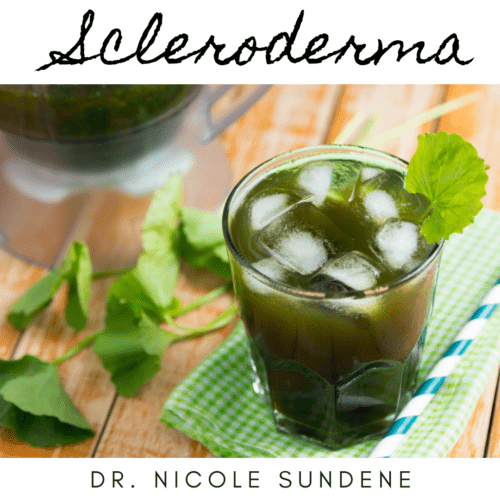
By Dr. Nicole Sundene, NMD
Holistic Dermatology & Autoimmunity
"Is there an herbal medicine for Scleroderma? Will Naturopathic Medicine help my autoimmune disease?"
~Cindy P, Scottsdale, AZ
Scleroderma is an autoimmune disorder that results in progressive fibrosis of the system as collagen connective tissue fibers overgrow and become deposited inappropriately in the blood vessels. Patients often complain of a white skin rash. The white color is caused by excess collagen in the skin.
Symptoms typically begin with Raynauds (lack of blood flow to fingers, pallor, pain and paresthesaias) accompanied by edema of the fingers, and tightening of the skin. Scleroderma can also be associated with a CREST variant which is an acronym for Calcinosis, Raynauds phenomena, Esophageal dysfunction, Sclerodactyly and Telangectasia. Primarily we are concerned with end organ failure as these collagen fibers become deposited in the kidneys, heart, bowel and lungs.
First I will discuss diet and lifestyle factors important for this disease, followed by a highly researched herbal medicine known to modulate the aberrant connective tissue production.
I have a special interest in autoimmune diseases because:
#1 I suffer from Lupus, an Autoimmune condition
#2 I have many referrals from other patients with Autoimmune disease because nobody else can really help them.
#3 I simply find Autoimmune Disorders very fascinating! Plus it responds well to Naturopathy.
MD’s become frustrated with autoimmune disease due to lack of good conventional treatments aside from prednisone, methotrexate and various chemotherapy drugs. The drugs are often more harmful to my poor autoimmune patients than their actual disease state! For mild to moderate autoimmune disease, Naturopathic Medicine is best in my experience.
Mainly because Naturopathic Medicine follow a therapeutic order that initially starts with addressing diet and lifestyle, fondly referred to as “The foundations for health." The more complicated the disease, the more basic the treatment plan. This means the more symptoms my patient has, the more likely there is an issue with their foundations of health, their nutrition, sleep, stress, or emotional state must be addressed.
Now chronic disease really fascinates me and the first thing I like to do is put on my “medical investigator” hat and try to figure out what is really going on. As a Hormone Doctor I often find underlying hormone imbalance impacting the immune system. Low progesterone or low estrogen especially can increase inflammation in the body which is why women experience more inflammatory conditions as they near menopause. Hormononal conditions like perimenopause, menopause and hypothyroidism can mechanically cause the skin to be dryer and therefore more susceptible to autoimmune attacks.
Testosterone stimulates oil production in the skin and when women begin to lose their testosterone around age 35 they notice premature aging of their skin and become more at risk for many dermatology conditions and skin rashes.
In my experience many things such as scleroderma that are labeled “etiology unknown” as in “the medical community cannot agree on what causes this, or there is no definitive evidence available as to what causes this…etc” still have a cause in that particular patient. If you have a chronic disease it is important that you sit down with a Naturopathic Doctor and allow them to diligently comb through your health history. Poor diet, toxic exposures to heavy metals, pesticides, and possibly even vaccinations received when ill are often concomitant.
Aspartame use is always of interest to me when working with someone with autoimmune disease. I am unsure if aspartame is the new “lead pipes” or “asbestos” and we just don’t have definitive evidence to get it off the shelves and out of peoples diets yet, or if particular individuals lack the necessary enzymes to metabolize it appropriately, or if they are allergic to the aspartame, but I find it peculiar that many women are addicted to diet soda and suffer from lupus, Sjogren's, scleroderma, rheumatoid arthritis, and even fibromyalgia have all been heavy aspartame users. If you are sick you should just plain and simple NOT use aspartame. I believe that it is better to err on the side of caution with this particular situation.
There is no nutritional need for this chemical in your diet and you can learn how to use stevia as an alternative sweetener. The aspartame has simply got to go. And when it does most patients interestingly enough, get better. In the last 100 years there are many incidences of man-made chemicals that were once declared as safe, eventually being deemed as having deleterious effects and being taken off the market. Initially the FDA didn’t even approve table sugar for household use. Too bad they did, right? Diabetes and obesity now run rampant in our society thanks to refined foods like sucrose and white flour.
Now that the aspartame is out of the diet lets get the rest of the chemicals out too. Splenda is not so splendid and that must also go. The only sugar free sweetener I consider safe to use is Stevia.
A whole foods, natural diet free of processed food is the best place to start if you have an autoimmune condition. The effects may take two weeks or two months, but I have never seen a patient with chronic disease not benefit from cleaning up their diet. Everyone benefits from a clean diet. My PGE-2 Diet has been developed from trial and error with my own patients using foods researched to reduce inflammation.
In addition to whole foods eating, I recommend autoimmune and Dermatology patients follow my "PGE-2 Diet" to learn how to easily temper inflammation through diet. Most of the treatments autoimmune patients are given are done to reduce inflammation in the skin which we can do naturally with diet changes.
A proper eight hours of sleep, stress management, and gentle exercise are the foundations to health for all autoimmune patients. Having any of these factors out of balance will impact the immune system adversely.
Last, but most importantly with any chronic disease, it is important to understand the emotional state of the patient. Recent research in the field of psychoneuroimmunology reveals how interrelated our thoughts are to how our immune system functions. One expert lecturer on the topic of auto-immunity brought up the interesting question “why is someone’s body attacking itself?”
Anger, and other unresolved emotions if present are well worth investigating with a therapist. Although a great deal of research exists to support the theory in autoimmunity that the immune system has gone haywire from attacking a virus it could not clear. Please make sure you are healthy emotionally and making good choices for your body and emotional state. I have seen many women over the years in very unhappy marriages adversely impact their autoimmune disease. Guess what happens when they get a divorce? They get better and need less medications.
With Scleroderma we want a normal acting immune system not one that is acting dysfunctionally and thus influencing the proliferation of fibroblastic activity which results in the excess deposition of collagen. Therapy is an important part of the treatment plan for anyone struggling with chronic disease because regardless of if the mind is contributing to the disease state, anyone that is sick still needs support.
Sometimes the support from friends and family simply is not enough. Especially for those that have trouble asking for help. A private counseling session to address the fears and concerns around having a chronic disease is integral for supporting the “mind, body, spirit” model in holistic care.
Specifically for scleroderma, the herb Centella asiatica commonly known as Gotu kola (shown above) has been used with some success in scleroderma patients as well as those prone to the development of keloids (excess scar production). A few studies working to develop a better delivery mechanism for the drug extract of this herb look promising. In the meantime tinctures and capsules of this plant are effective. Do not use teas as the active components are not water soluble and therefore do not extract well in water and require alcohol.
Before using any herbs everyone should always check with their Naturopathic Doctor for drug-herb interactions. Also, whenever trying any new therapy be sure to have lab markers drawn pre-treatment, and a few months into treatment to see how your immune system is responding. If improvement is not noted in the skin after three to six months, a change in treatment plan may be necessary, or a more aggressive approach.
Remember that most natural remedies take about one month to work for every year that an individual has had a chronic disease. Gotu Kola has been shown to be safe in laboratory animals with the toxic dose being 40-50mg per/kg of body weight.
You can purchase Gotu Kola in capsules at any reputable health food store. I like Nature's Way brand as a trusted inexpensive option available to patients over the counter. If you use the capsules by Nature’s Way, keep in mind that each capsule is 435mg of Gotu Kola and the standard daily dose is 2-4 mg daily. So a typical starting dose would be about 3 capsules twice daily.
It is important patients understand they will need to maintain a high dose for it to really be effective. We are working towards long term improvement, which will require 3-6 months of effort to reverse the damage caused by autoimmunity. There are not quick fixes and we need to think about working to prevent progression, as well as listening to the negative message our body is sending through our skin to understand what it truly needs.
If you need my help with any Dermatology or Autoimmune conditions simply pop over to my SCHEDULE page to book your Naturopathic visit.
~Dr. Nicole Sundene
(480) 837-0900
Dr. Sundene is a Naturopathic Doctor in Scottsdale, Arizona, and a Female Hormone Expert in Women's Health and Bioidentical Hormones. She specializes in Holistic Women's Health for Menopause, Thyroid, Hashimotos, PMS, Perimenopause, Autoimmune, Postpartum, Chronic Fatigue, Depression, Anxiety, Food Allergies, Digestion, Dermatology, Acne, Psoriasis, Eczema, and Adrenal Hormonal Conditions. In 1999 she began working for a Hormone Doctor prior to starting Naturopathic Medical School. With over 23 years of experience in both Prescription and Natural women's health and hormones, she presents to women the best-integrated health solutions for their Chronic Disease. She has been an Herbalist for over 28 years and enjoys teaching women how to use herbs to balance their hormones, nutrition and optimize their health. Dr. Sundene relies on blood testing for her hormone metrics. The hormone testing is covered per the patient's insurance plan (not Medicaid) and conducted at certain points in the woman's menstrual cycle. To learn more about Hormone Testing for Women Visit: Bioidentical Hormones. Follow Dr. Sundene on Instagram, Twitter, and Facebook for more tips on Women's Health, Female Hormones, and Naturopathy!
References:


